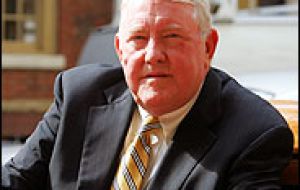MercoPress. South Atlantic News Agency
Goldman Sachs defends 2001 swap-deal to mask debts of Greece
 Gerald Corrigan, chairman of Goldman Sachs Bank USA
Gerald Corrigan, chairman of Goldman Sachs Bank USA Goldman Sachs defended the 2001 debt-swap deal with Greece that may have allowed the country to mask the extent of its debt woes. Gerald Corrigan, chairman of Goldman Sachs Bank USA, the bank's holding company, said it was “consistent” with the regulations of the time.
However, speaking in the UK, he admitted that “with hindsight” it should have been more transparent. The debt-swap deal was legal at the time, but has since been prohibited.
The complicated “currency swap” financial deal between Greece and Goldman Sachs is now being investigated by the European Union (EU) after it was discovered by the EU statistics agency Eurostat.
It is claimed that the deal enabled Greece to hide the extent of both its public deficit and national debt. The EU has given Greece until the end of February to give details of how it affected its accounts.
Speaking before the UK's Treasury Committee of MPs, Mr Corrigan said the deal was far from unique at the time.
“It is true that a family of currency swaps that were entered into jointly by Greece and Goldman Sachs were of a nature that they did produce a small, but not insignificant reduction in Greece's deficit and debt,” he said.
“They were very much consistent and comparable with the standards and behaviour of measurements used by the European Community [at the time].”
Mr Corrigan added that since EU rules on the matter were modified in 2007, it suggested they “were more liberal than they could have been back in 2001”.
He added that such currency swaps at the time were “not limited to Goldman Sachs and Greece”, but said he did not know which other banks or countries may have had similar deals in place.
Greece's Finance Minister George Papaconstantinou also insisted last week that his country was not the only one using such financial arrangements back in 2001.
He added that such deals had now “been made illegal, and Greece has not used them since”.
Mr Corrigan was giving evidence to the Treasury Committee as part of its enquiry into the global banking sector.




Top Comments
Disclaimer & comment rulesCommenting for this story is now closed.
If you have a Facebook account, become a fan and comment on our Facebook Page!